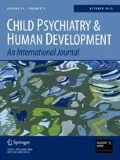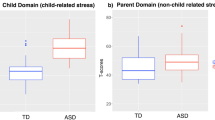Abstract
The purpose of this study was to identify the perceived stressors experienced by parents who care for children with Pervasive Developmental Disorders. The relationship between demographics and overall stress was also examined. The most frequently cited stressor was difficulty arranging for and collaborating with professional and support services. Problems associated with the child's emotional and mental state were viewed as the most stressful of all. No demographic variables showed a significant relationship to degree of overall stress.
Similar content being viewed by others
References
Birenbaum A, Guyot D: Health care for children with autism: Utilization, financing and expenditures. In:Financing of mental health services for children and adolescents, ed. Widen P, Fishman M. Rockville, MD: NIMH and the Bureau of Maternal and Child Health and Resources Development, 1988.
Institute of Medicine:Research on Children and Adolescents with Mental, Behavioral and Developmental Disorders. Report of a Committee of the Division of Mental Health and Behavioral Medicine. Washington, D.C.: National Academy Press, 1989.
Masters J, Cerreto M, Mendlowitz D: The role of the family in coping with childhood chronic illness InCoping with chronic disease: Research and applications ed. Burish T, Bradley L. New York: Academic Press, 1983.
Sargent J: The sick child: family complications.Developmental and Behavioral Pediatrics 41:50–56, 1983.
Dupont A: A study concerning the time-related and other burdens when severely handicapped children are reared at home.Acta Psychiatrica Scandinavica 62:249–257, 1980.
Schopler E, Mesibov G.:The Effects of Autism on the Family. New York: Plenum Press, 1984.
Goodman R: Infantile autism: A syndrome of multiple primary deficits?Journal of Autism and Developmental Disorders 19:409–424, 1989.
Gillberg C: Autism and pervasive developmental disorders.Journal of Child Psychology and Psychiatry 31:99–119, 1990.
Kaplan H, Sadock B:Synopsis of Psychiatry: Behavioral Sciences and Clinical Psychiatry (5th Ed.). Baltimore, MD: Williams & Wilkins, 1988.
Lovaas O.: Behavioral treatment and normal educational and intellectual functioning in young autistic children.Journal of Consulting and Clinical Psychology 55:3–9, 1987.
Rutter M: Infantile autism and other pervasive developmental disorders. InChild and Adolescent Psychiatry: Modern Approaches (pp. 545–566), ed. Rutter M, Hersov L. Oxford: Blackwell, 1985.
Hollingshead A:Two Factor Index of Social Position. New Haven, CT: Yale University Press, 1957.
Marcus L: Coping with burnout. InThe Effects of Autism on the Family (pp. 311–326), ed. Schopler E, Mesibov G. New York: Plenum Press, 1984.
Cutler B, Kozloff M: Living with autism: effects on families and family needs. InHandbook of Autism and Pervasive Developmental Disorders (pp. 513–527), ed. Cohen D, Donnellan A, Paul R. New York: Wiley & Sons, 1987.
Rubin S, Quinn-Curran N: Lost, then found: parents' journey through the community service maze. InThe Family with a Handicapped Child, (pp. 63–94) ed. Seligman M. New York: Grune & Stratton, 1983.
Lyon S, Preis A: Working with families of severely handicapped persons. InThe Family with a Handicapped Child, (pp. 203–232), ed. Seligman M. New York: Grune & Stratton, 1983.
Holyroyd J, McArthur D: Mental retardation and stress on the parents: a contrast between Down's syndrome and childhood autism.Am J Mental Deficiency. 80:431–436, 1976.
Berger, M, Fowlkes M: Family intervention project. A family network model for serving young handicapped children.Young Children 51:22–32, 1980.
Mori A:Families of Children with Special Needs. Rockville, MA: Aspen Publications, 1983.
Devereaux-DeLuca K, Cohen-Salerno S:Helping professionals connect with families with handicapped children. Springfield, IL: Charles C Thomas Publisher, 1984.
Kazak A, Marvin R: Differences, difficulties, and adaptation: stress and social networks in families with a handicapped child.Family Relations, 33:67–77 1984.
Abbot D, Meredith W: Strengths of parents with retarded children.Family Relations, 35:371–375, 1986.
Harris S: A family systems approach to behavioral, training with parents of autistic children.Child and Family Behavior Therapy, 4:151–173, 1982.
Harris S, Powers M: Behavior therapists look at the impact of an autistic child on the family system. InThe Effects of Autism on the Family (pp. 207–224), ed. Schopler E, Mesibov G, New York: Plenum Press, 1984.
Lamb M: Fathers of exceptional children. InThe Family with a Handicapped Child (pp. 125–146), ed. Seligman M. New York: Grune and Stratton, 1983.
Marcus L, Schopler E: Working with families: a developmental perspective. In:Handbook of Autism and Pervasive Developmental Disorders, (pp. 499–512), ed. Cohen D, Donnellan A, Paul R. New York: Wiley & Sons, 1987.
Cantwell D, Baker L: Research concerning families of children with autism. InThe Effects of Autism, on the Family, (pp. 41–63), ed. Schopler E, Mesibov G. New York: Plenum Press, 1984.
Freidrich W, Wilturner L, Cohen D: Coping resources and parenting mentally retarded children.Am J of Mental Deficiencey, 90:130–139, 1985.
Goldberg S, Marcovitch S, MacGregor D, Lojkasek M: Family responses to developmentally delayed preschoolers: etiology and the father's role.Am J of Mental Deficiency, 90:610–617, 1986.
Schopler E, Mesibov G:The Effects of Autism on the Family. New York: Plenum Press 1984.
Moroney R: Public social policy: impact on families with handicapped children. InUnderstanding and working with parents of children with special needs ed. Paul J. New York: Holt, Rinehart, & Winston, 1981.
Author information
Authors and Affiliations
Additional information
This study was supported by a research grant from the Academic Senate of the University of California, San Francisco. The assistance of Ann James in the data collection was greatly appreciated.
Rights and permissions
About this article
Cite this article
Weiss, S.J. Stressors experienced by family caregivers of children with pervasive developmental disorders. Child Psych Hum Dev 21, 203–216 (1991). https://doi.org/10.1007/BF00705906
Received:
Revised:
Accepted:
Issue Date:
DOI: https://doi.org/10.1007/BF00705906




